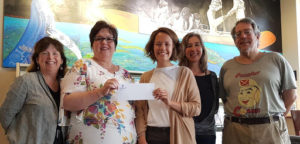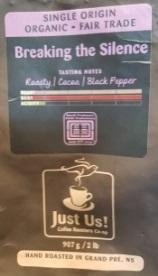This article, written by Janette Fecteau, BTS Member and Part-time Academic Instructor in Fine Arts, appears in the Summer 2018 edition of The Beacon.
The StFXAUT has had a rewarding connection with the Maritimes-Guatemala Breaking the Silence Solidarity Network (BTS) for close to 20 years. Members of our Union have invited speakers from Guatemala into our classrooms, have acted as Faculty Leaders for the Immersion Service Learning Guatemala experience, and have organized films, speakers, and other events in the Antigonish community. (For a more in-depth look at this history, see Philip Girvan’s article “The StFXAUT Breaking the Silence (BTS) Connection” in the Spring 2017 issue of The Beacon.) This past May, I had the privilege of participating in the 2018 BTS delegation to Guatemala, an annual learning tour that visits grassroots organizations working on human rights, social justice, Indigenous land rights and education, feminism, and more. The 14-day itinerary was packed! Rather than offer a diary of all our meetings and experiences, I will reflect on three topics dear to the hearts of StFXAUT members: education, research, and—coffee.
Focus on Indigenous Education
The New Hope Foundation school, in the highlands town of Rabinal, is one of BTS’s oldest partners and has operated since 2003 with an impressive curriculum grounded in Maya Achí culture. The Maya Achí are one of 23 separate Indigenous groups in this Central American country, and their region was intensely affected by the internal armed conflict (1954-1996). A violent scorched-earth program perpetrated by state forces and state-authorized paramilitaries disproportionately focused on areas with high Indigenous populations. Jesús Tecú Osorio, 2008 StFX honorary doctorate recipient, is a survivor of the 1983 massacre in Rio Negro, one of six that occurred in the area during the early 1980s. He founded the school with funds from the John F. Kennedy Foundation’s Reebok human rights award granted him in 1996.

The school teaches junior high academic curriculum and high school-level vocational training in the field of community development, both grounded the Maya Achí culture which was disrupted during the internal armed conflict. The language is taught as a subject and a language of instruction along with Spanish. The day we visited, students showed us traditional foods, crafts, dances, and farming methods. Younger students invited us to participate in a traditional market, where they had prepared a dozen or so different foods and crafts. They performed an ancient dance called the “Rabinal Achí” which now has UNESCO World Cultural Heritage status. Older students and their instructors showed us around organic gardens, greenhouses, and shade houses burgeoning with tomatoes, peppers, coffee, and a traditional grain, amaranth.
New Hope Foundation student explains that both the leaves and the grain, amaranth, were traditionally used by the Maya Achí. During colonial times, she says, Spanish colonizers wanting to maximize the work capacity of the Indigenous people discouraged its cultivation in favour of corn, which promotes strength.

One of my fellow delegates, Dr. Juan Carlos Martinez of Mount Allison, remarked that here the students are subjects, not objects: a new and hopeful approach. Many graduates have gone on to university or college, and some are now teachers at the school. The school’s curriculum is recognized by the Guatemalan government, but receives no state funding and is entirely dependent on international donors. School director Sandra Lopez shared with us how frustrating it is for her to struggle constantly with the government for funding.
In June 2018, the StFXAUT sponsored a talk in Antigonish by school director Sandra Lopez, recent graduate Lilian Bolvito and a current student Andrès Colocho Chachal. Having spent three days in Eskasoni, they spoke about the similarities between the Indigenous cultures of Guatemala and Canada, such as the association of particular precepts, spiritual qualities, and colours with the cardinal directions, the sacredness of the earth, and the connection of all living beings.
They also spoke of the similar histories of colonialism, and the racism Indigenous people experience in both territories. Breaking the Silence has always looked for opportunities to use its privilege to be a bridge between its Mayan and Xinka partners in the south and Mi’kmaw and Maliseet people in the Maritimes. BTS’s annual guest speakers visit Indigenous communities in the Maritimes, and Indigenous people have participated in delegations to Guatemala. BTS volunteer and Mi’kmaw youth Hannah Martin writes in her blog of the experience of living in Rabinal and working at the school for three months:
…after hearing in-person, from community members and students that I work with, about the history here, I feel that this experience could not be any more enriching, suitable and powerful for me (June 1, 2016).
Now, through the support of the StFXAUT, BTS bursaries will be available for Indigenous people and Guatemalans living in Canada to participate in an upcoming tour (next scheduled for Fall 2019).
Restoring an Important Archives
One of only two organizations we visited that were not grassroots community groups (the other being the Canadian Embassy!) was the Historic Archives of the Guatemalan National Police. The fascinating story of the discovery of this extensive paper archives was outlined to us: eighty million documents from the National Police dating to the turn of the century and including records kept during the internal armed conflict, were accidentally discovered in 2005, when investigators responded to local Guatemala City residents’ complaints of danger of explosion in the old police buildings. The documents were in terrible condition—subject to moisture, dust, and vermin. They had been stored in piles on cement floors in what had previously been a notorious detention and torture centre in Guatemala City.

photo credit: Stacey Gomez
The logs, photos, reports, memos, letters, etc. are being painstakingly restored, digitized, and stored. They provide evidence in human rights cases stemming from the war, including charges of genocide, and also help individual families learn what happened to their disappeared loved ones. The Archives operates under the auspices of the Guatemalan Ministry of Culture, but receives zero budget from that Ministry, and is entirely dependent on international donations. The dedicated team of archivists often works for periods without pay. Only a quarter of the documents are currently stored properly on shelves. The rest are piled in boxes on the floor, atop cinder blocks in case of flooding. The archival team expects the work will take 20 more years. It was very moving for us to see pages of identity photos of victims of state repression. “They shouldn’t have been in that book,” said my fellow delegate Margaret Greene. “They shouldn’t have been in any book. They should have lived their lives.”
Coffee, Corruption, and Killings
Since 2001, a three-way partnership between BTS, JustUs! Coffee Roasters Co-op in Grand Pre, NS, and the Small Farmers’ Committee of the Highlands (CCDA) in Guatemala has resulted in the “Breaking the Silence” roast by JustUs!. Our delegation visited the headquarters of the CCDA near San Lucas Toliman, a small town in a coffee-growing region in the highlands, on the shores of Lake Atitlan. Members of the CCDA’s leadership team showed us around the processing plant, and explained the many steps of the coffee harvesting and roasting process, including the grading and selecting of the highest-quality beans. The international sale of fair-trade organic coffee is a means to an end for the CCDA: it funds their grassroots work on Indigenous land rights, access to land, gender equality, literacy, education in organic farming, and community development. The CCDA supports approximately 30,000 families of small farmers in 20 of the 22 departments of Guatemala. Founder Leocadio Juracán is now a member of the Guatemalan Congress.
Lubia López describes the extensive work of the CCDA in 20 of the 22 departments of Guatemala; photo credit: Stacey GomezBecause they are one of the largest politically active Indigenous organizations in the country, the CCDA has long been the target of criminalization and repression. In what is believed to be a backlash against the arrests and convictions of over 200 prominent politicians and business people for corruption in 2015-2017, there has been an upswing in human rights violations against civil society. While our delegation was in the country, sickening cluster attacks were taking place. Seven activists from the CCDA and a sister organization, the Campesino Development Committee (CODECA) were murdered execution-style by bullets or by machete between May 9th and June 8th. Instead of taking a moment of silence in memory of recently-killed companeros José Can Xol and Mateo Chamán Paau, our CCDA presenter Lubia López invited us to fill the room with sound by clapping for a full minute. We were moved to stand as we applauded the dedicated lives and work of these men, who both leave behind young families. Members of the CCDA executive later explained that although they are sorrowful about these losses, they feel more compelled than ever to continue to struggle for justice on behalf of the families they support.
StFXAUT & BTS: Facilitating Meaningful Exchange
Standing in front of Alan Syliboy’s painting, “The Dream Canoe”, Dr. Mary Oxner, StFXAUT President (left) presents a cheque to Amy Brierley (right) accompanied by Members of Breaking the Silence and the StFXAUT: (left of Mary) Nancy Forestell; (right of Amy) Janette Fecteau and Bob Zecker; photo credit: Susan MacKay.Most of the fourteen organizations we met with on the May 2018 delegation are created, led, and run by Indigenous Guatemalans. As we learned about their struggles for land rights affirmed by the 1996 Peace Accords, their efforts to recover culture, language, and land after a genocidal civil war, the constant underlying racism pervading the country, and the courage, imagination, and resilience of people in the grassroots movements, we were reminded again and again of parallel struggles in Canada. That is why BTS is so excited about the StFXAUT’s support for the participation of an Indigenous or Guatemalan person living in Canada on the next delegation. Breaking the Silence looks forward to this enriching North-South exchange, and to a continued fruitful partnership with the StFXAUT.
……………………………………………………………………………………………………………………………………………………………………………………………………………………………………………..
If you live in Antigonish and would like to order Breaking the Silence (BTS) coffee, please contact Janette Fecteau at jfecteau[at]stfx[dot]ca



